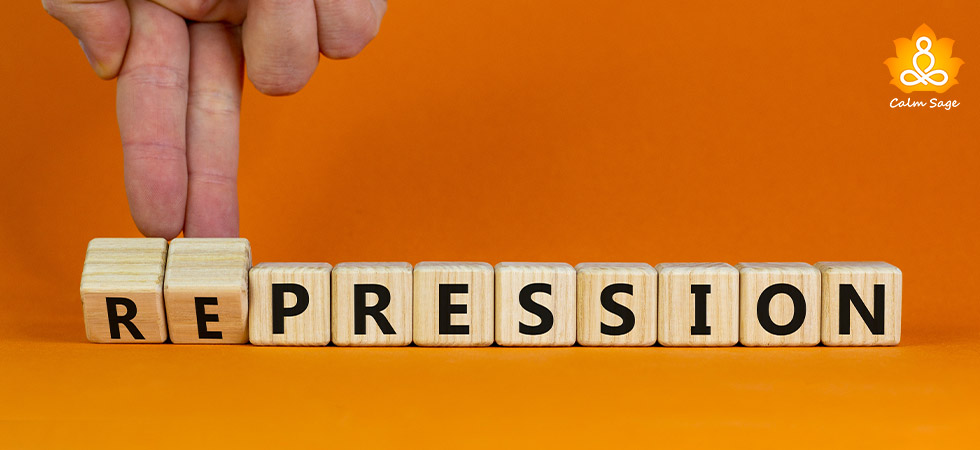Understanding Repression As A Defense Mechanism

Are you pro at blocking unpleasant emotions, thoughts, and memories unconsciously?
Well, if you do so, you might be repressing your thoughts. Repression is a type of defense mechanism that minimizes feelings of anxiety and guilt. Yes, you might be right, repression is an effective type of defense mechanism!
But, do you know that it can be only effective initially, as it becomes difficult to deal with difficult emotions? According to Sigmund Freud, repression can cause psychological distress.
In this blog, we will understand what repression is and how it is used as a defense mechanism. So, let’s get started!
What is Repression?
Repression is a defense mechanism for mental health. During repression, our brain forces amnesia in the mind and tries to erase the memories related to traumatic events that are too negative or painful to carry. Some psychologists refer to repression as dissociative amnesia. Dissociative amnesia is a mental health condition revolving around memory gaps.
However, repression can include emotions, memories, thoughts, and ideas related to a traumatic event. It’s a type of “motivated forgetting” wherein someone’s mind unconsciously and actively removes unwanted memories and thoughts.
According to Sigmund Freud, the unconscious mind shows a powerful impact on personality and could also result in psychological distress. This belief led him to describe the theory of repression in psychology. Repression was identified by Freud wherein he focused on unconscious feelings and the urge to be aware so that the individual can deal with it consciously.
Types of Repression
According to psychologists, repression can be experienced by anyone and this defense mechanism can affect anyone regardless of their age, gender, or the presence of mental health issues or mental stability. According to psychology, there are 5 types of repression:
1.Oedipus Complex
When children go through the procedure of genital stage, they are viewed as same-sex parents who oppose the attention of parents of the opposite sex. In such situations, aggression is repressed so that the child can identify with the same-sex parent. This process is known as Electra Complex in females and Oedipal Complex in males.
2.Repressed Memories
Some memories are counted to be too intense, traumatic, painful, or overwhelming. Particularly, childhood trauma can result in the repression of memories that are pushed away from the conscious mind for protection. Repressed memories can re-emerge in adulthood and can have adverse impacts on multiple aspects of life.
3.Repressed Trauma
Some traumatic events or experiences can create traumatic memories which can be too overwhelming or painful to process. Repressing such traumatic memories might help you for some time, but these memories can re-emerge later and can act as residual trauma.
4.Repression-Related Phobias
Traumatic experiences activate our brain for the removal, however, the effects remain still. This can result in repression-related phobias in late life and some specific phobias can be originated.
5.Sexual Repression
Sexual exploitation or abuse repressed sexuality. As a result, some people start feeling guilty about their sexuality and impulses.
Signs and Symptoms of Repression
Below listed are some of the signs and symptoms of repression:
- Uneasiness or uncomfortable around sources of repression or trauma
- Extreme mood swings that indicate the reappearance of repressed memories
- Chaotic or messy life
- Excessive use of alcohol or substance use disorders, OCD, and other mental health issues related to repression
- Risky addictions
- Stress, depression, or anxiety
- Elevated blood pressure
- Obesity
- Dizziness and pain
Differences Between Repression and Suppression
Repression |
Suppression |
|
|
|
|
|
|
|
|
Impacts of Repression
Below listed are some of the impacts of repression on life:
- Decreased immune system
- Dreams
- Development of mental health conditions such as anxiety or depression
- Phobias related to specific things that people can’t generally remember
- Physical health issues
- Unconscious thoughts
Treatment for Repression
If you think you or your loved one are struggling with repressed memories or traumatic memories, you can refer to this section to know how to get the right help.
The first step towards treatment is to get a proper diagnosis and connect with an experienced and registered therapist to learn about your emotions, impulses, and memories.
A therapist might help in exploring past experiences to discover repressed memories. To connect with a certified and experienced mental health professional, refer to:

Great for a large network of licensed therapists
-
$60 to $90/week, billed every 4 weeks
-
Therapy via messaging, phone, or live video chat
-
Flexible cancellation at any time
20% off your first month

Great for CBT Based therapists
-
$40/week, billed every 4 weeks
-
Therapy via messaging, phone, or live video chat
-
Specialization for CBT based Therapy
20% off your first month

Best for Treatment Plants
-
$60 to $90/week, billed every 4 weeks
-
Therapy via messaging, phone, or live video chat
-
Flexible cancellation at any time
$100 off your first month with code SPACE
After diagnosis and assessment, a therapist is likely to prescribe one of the following therapy options:
I hope this blog helps you understand what repression is in psychology and its theory. Comment down and share your views on the same.
For more such content, connect with us through all social media platforms.
Thanks for reading!




















